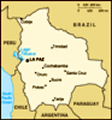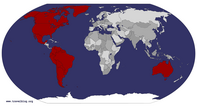Advertisement
Published: December 11th 2010

 The greatest carrot ever
The greatest carrot ever
Found whilst doing my job in the human depositoMornings
Life began at 6:30AM with a knock on our dorm room door and the knocker saying “good morning” in their cheeriest voice. Gado and Sebastian were the only two people on wake up duty whilst we were there. It was a job that sucked because you had to get up at 6:25 but it had the benefit of being your only daily task. Usually I would lie in until 7AM before getting up to do my weekly task. Weekly tasks went from 7AM until 7:30 and were such jobs as cutting up fruit and veg for Herbie or the birds, cleaning out the aviaries or, my personal favourite, digging drainage ditches. Weekly tasks were rotated each Sunday. From 7:30 until 8AM you had your daily task to do and these were such jobs as cleaning the patio, cleaning the showers and toilets, preparing breakfast. Some of these jobs were done later in the day too, such as preparing and cleaning up after dinner or putting the pios to bed. A couple of times we were told that if you had finished your daily task early you should go help other people do theirs rather than go back to bed for
a quick nap before breakfast. I thought that was a load of crap. People who had daily tasks at night (cleaning up after dinner etc) never got a helping hand, so why shouldn’t they enjoy a little free time in the morning considering they wouldn’t get it that evening? Besides, no job was really that strenuous – if you couldn’t get your own shit done by 8AM you were either lazy or stupid.
I had done a handful of daily and weekly tasks when my morning routine changed rather drastically. The Boss and I had been having a play fight over breakfast and she was refusing to give me our jar of coffee. At morning announcements (done by Zac at 8:30AM every day as we finished breakfast) Zac said that we needed a new person to do the candy shop. Candy shop was a few shelves in the dining hall with chocolate bars, biscuits, noodles and such that volunteers could buy with proceeds going to the park. Basically the job itself entailed keeping a record of what people ate, what they owed and occasionally going to Guarayos to restock the supplies. Anyway, when no one volunteered for the job I

 The shower block
The shower block
Deliciously cold!piped up, “Good on you love. The Boss will do it!” She got a round of applause, there was a titter of laughter and I leaned across the table and said to her, “don’t you EVER withhold coffee from me again!”
Two announcements later Zac says that they need a new person to take on the job of doing the human and animal depositos. This was a job that meant getting up earlier than everybody else and sorting out the off, rotting and rat-eaten food in the human storage building to be given to the animals and also organizing what the birds, Herbie, Rudolpho and the pios would be eating every day. No one volunteered and my heart sank. “Well looks like Joe’s doing that one,” said the Boss. Everyone laughed much harder this time. It actually turned out to be ok. I worked out pretty quick that I didn’t really need to be up until 6:40, that I could get all the work done within half an hour and it meant I never had daily or weekly tasks ever again.
9AM was time to start work with the animals. Walking out to Ru was a twenty minute walk so
it was nice to change to Rupi, where the walk to work was a mere 5 minutes away. A typical morning with Rupi involved changing the water in one of his water bowls (he had to connected cages with a bowl in each) and then taking the big boy out for a walk. The cooler the weather, the longer Rupi’s walks tended to be and so with seven oppressively hot days in a row the week I left, Rupi had his walk down to a 45 minute affair! We would stay with him until 11 (admittedly an hour earlier than we are told to but he’s would usually snooze once he was back in his cage and he didn’t need my company for that) before heading back to camp where I would usually lay on my bed and read until lunch at 12:30PM.
Afternoons
Lunch was consistently the best meal of the day. Breakfast was tea, coffee, two small (and usually stale) rolls and sometimes a banana or mango. Dinner was almost always a vegetarian stew consisting mainly of potatoes. But lunch was where the ladies in the kitchen showed that they weren’t as bad as the ref ladies

 The old animal deposito
The old animal deposito
Admittedly a little run down but, trust me, that just meant it fit in with the other buildingsof St Joseph’s College Hunter’s Hill (yes, the boy from the rich boarding school will complain about the food and you will think he’s a snob.) The Boss was a particular fan of their deep-fried cauliflower though I’d have to say the standout for me was their crumbed aubergine. Regardless, the amount of bread, potatoes, rice and pasta served in a single day meant that Atkins was not an option.
After lunch there was a break until 2PM which almost everyone used as an opportunity to have a siesta. I also liked to use this as my chance to visit the bathroom. Now Sul, you have often commented on not wanting to read about my bathroom visits, so I’ll try to paint a delicate picture but it’s part of the parque that had to be mentioned. There were two pit toilets – Don Pablo and the Chocolate Pudding Palace. Making sure they were vacant was as simple as yelling out either one of their names. If you got an “occupado” you had to do some waiting. Plenty of people waited for me and Don Pablo.
The afternoon session started at 2PM, although with so many people having just awoken from
their siesta, it was generally a tad later. Rupi’s afternoon walks were the same as his mornings – the length was temperature dependant. The only real difference was that you could guarantee that he would have had enough of his walk and would return to his cage by 3:30PM because that was lunch time! Once again, he would be locked in his smaller cage whilst we would go in, clean his water bowl and the platform he ate from then empty his lunch – 3kgs of meat (usually beef but occasionally an entire chicken!) Once we were safely out and the cage was locked he was let back in to have his feed.
Construction
As the parque tried to be as self sufficient as possible, often either your morning or afternoon was spent on construction rather than with your cat. There was always a construction project happening in the parque, what was frustrating was the amount of projects that were left unfinished. A new aviary had been started – standing almost three stories tall and with all the support structures already in place, it had clearly had a lot of time and money spent on it and then left
for the jungle to start enveloping it. There was also a new quarantine area which they had began 9 months earlier but wasn’t mentioned the entire time I was there. Exactly what was wrong with the current quarantine I never found out, although I guess not enough to warrant finishing a new one.
Nevertheless, whilst I was there two major construction projects were underway. The first was a cage for a Puma named Roy who was coming to the parque from Macchia. I was actually quite impressed with how quick Roy’s cage went from being a piece of cleared land to a finished cage. The other was a new animal deposito. This was a building where food for the animals was to be kept and for the life of me, I had no idea why they decided they needed to start that particular project rather than finish either of the other two. I went in to the animal deposito every day as part of my daily tasks and, whilst rats and mice clearly got in to it overnight, they got in to the dining room and the human deposito too. They were always going to lose a portion of their food to the rodent population, this couldn’t be helped.
Anyway, working on the animal deposito was an eye opener, because the Bolivians who lived at the parque permanently, rather than the volunteers, oversaw its construction. Now I don’t want to give the impression that the Bolivians had no idea about what they were doing but they had
almost no idea. They would mark where to dig the holes for their support posts by drawing a line not with a rule or even a piece of wood but with their finger in the dirt. When the hole they dug turned out to be half a foot wide of where it needed to be they just made it wider, so the support beams were in holes as wide as the beam was long. They would use a spirit level to make sure that their beams were straight but hold the level at elbow height and look down on it. I wasn’t sure how to explain the parallax error in Spanish so I let it go. When attaching a door they affixed it so that the support strut was at the bottom, not the top, ensuring the door would sag within the year. I was so bad at design and technology that I once just put my project in to a vice and tightened it until it broke so I wouldn’t have to keep doing it but the basic shit they were getting wrong had me flabbergasted.
But the worst thing of all was the lack of efficiency.
Q. How many Bolivians does it take to mix cement?
A. Six – one to shovel the sand, one to mix it and four to look on.
That’s not even a joke, it was what I did for a whole afternoon! One of us would shovel in sand, another would mix it and pour it out and a third would smooth it out. Which would be fine if three more of us didn’t stand around doing nothing. Sure we’d take turns shovelling and mixing but there were always at least three and usually four people doing nothing. If they had a plan then maybe these other people could have been moving on to prepare for whatever the next step was but as far as I could tell, they were just building it from memory of the last one they built. The whole thing was enough to give my old man the heart attack he keeps telling us about.
Evenings
I’d be back at camp at 4PM (again, an hour early but if I couldn’t walk him I wasn’t staying out there to get eaten alive by mozzies while he napped or ignored me) and either read or go to the shop. Situated right on the boundary of the park, the shop was a fifteen minute walk away from camp along the main road and sold cold beer and (apparently) other things. The shop only had a small fridge/freezer until our last days at the park (when they invested in a second, much larger, freezer) so usually the amount you drank there was regulated by the fact that they rarely had more than a six pack cold. So when four of us turned up, it was a beer and a half each before heading back to camp.
Back at camp I’d have a shower, all of which were cold which was amazing after a day sweating like crazy in 30 degree plus weather wearing long pants, shirt and boots to keep the mozzies off. Dinner was at 6:30PM and then the rest of the night was free. Sometimes we would get the 7PM flota (bus) in to the nearby village of Santa Maria where one of the parque’s cooks owned a store that had electricity to charge iPods and cameras and a TV and DVD player so our lives weren’t completely devoid of these wonderful inventions. However the only flota back wasn’t until 10PM so instead just walking to the shop became the evening activity of choice. Generally two or three cold beers was enough to have me yawning as big and loud as a jaguar and I’d be in bed by 9PM.
The beds in the dorms were bunks with mattresses made out of straw. My first was actually quite comfortable but I moved to a bottom bunk after two weeks and that mattress would see me waking up with the faintest hint of a bruise on the thigh I had slept on. Really though, the only thing that had the power to wake me up or, if it kicked in before I went to sleep, was Max’s snoring. Max was a Dutch guy who stayed in our dorm and snored louder than anyone I’ve ever encountered before. What was worse, it didn’t matter if he was on his back, side or stomach – Max snored. On his first night I tried being patient with him, waiting for it to stop as snoring can do. When that didn’t work I tried shining a torch in his eyes. When that didn’t work I gently called out to him, “Max... Max... Max?”
“MAX STOP SNORING!” The Boss bellowed. That worked.
Advertisement
Tot: 0.207s; Tpl: 0.019s; cc: 9; qc: 50; dbt: 0.0609s; 1; m:domysql w:travelblog (10.17.0.13); sld: 2;
; mem: 1.1mb









